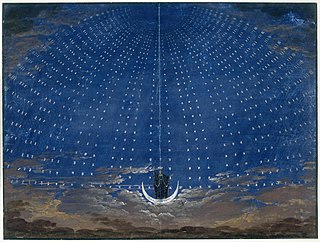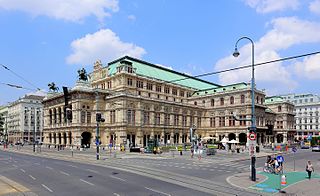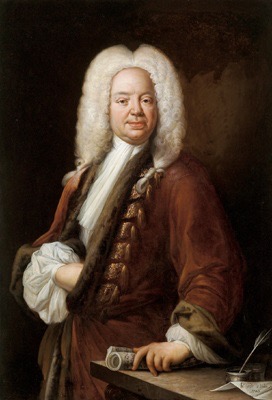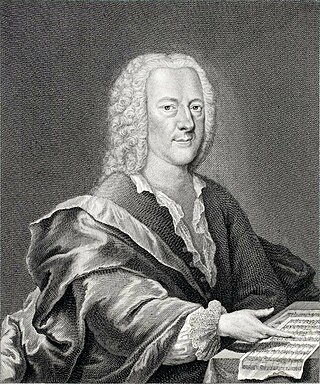
The Magic Flute, K. 620, is an opera in two acts by Wolfgang Amadeus Mozart to a German libretto by Emanuel Schikaneder. The work is in the form of a Singspiel, a popular form during the time it was written that included both singing and spoken dialogue. The work premiered on 30 September 1791 at Schikaneder's theatre, the Freihaus-Theater auf der Wieden in Vienna, just two months before the composer's premature death. Still a staple of the opera repertory, its popularity was reflected by two immediate sequels, Peter Winter's Das Labyrinth oder Der Kampf mit den Elementen. Der Zauberflöte zweyter Theil (1798) and a fragmentary libretto by Johann Wolfgang von Goethe titled The Magic Flute Part Two.

Pomona was a goddess of fruitful abundance in ancient Roman religion and myth. Her name comes from the Latin word pomum, "fruit", specifically orchard fruit.

Opera in German is that of the German-speaking countries, which include Germany, Austria, and the historic German states that pre-date those countries.
Reinhard Keiser was a German opera composer based in Hamburg. He wrote over a hundred operas. Johann Adolf Scheibe considered him an equal to Johann Kuhnau, George Frideric Handel and Georg Philipp Telemann, but his work was largely forgotten for many decades.

Der beglückte Florindo is an opera composed by Handel at the request of Reinhard Keiser, the manager of the Hamburg Opera. It was first performed at the Theater am Gänsemarkt in January 1708. It was probably directed from the harpsichord by Christoph Graupner.

The Roman Unrest, or The Noble-Minded Octavia, commonly called Octavia, is a singspiel in three acts by Reinhard Keiser to a German libretto by Barthold Feind. It premiered on 5 August 1705 at the Oper am Gänsemarkt, Hamburg.

Georg Caspar Schürmann was a German Baroque composer. His name also appears as Schurmann and in Hochdeutsch as Scheuermann.

Catone in Utica is an opera libretto by Metastasio, that was originally written for Leonardo Vinci's 1727 opera. Following Vinci's success, Metastasio's text was used by numerous composers of the baroque and classical eras for their own operas, including Pietro Torri (1736), Antonio Vivaldi (1737), Giovanni Battista Ferrandini (1753) and J. C. Bach (1761).

Alfred is a heroic opera in three acts by the Czech composer Antonín Dvořák. It was Dvořák's first opera and the only one he composed to a German text. The libretto, by Carl Theodor Körner, was set by Friedrich von Flotow, based on the story of the English king Alfred the Great. Composed in 1870, Alfred was not performed during Dvořák's lifetime. The opera premiered at the City Theatre, Olomouc on 10 December 1938.
Johann Philipp Förtsch was a German baroque composer, statesman and doctor.
Johann Sigismund Kusser or Cousser was a composer born in the Kingdom of Hungary who was active in Germany, France, and Ireland.
Friedrich Christian Bressand was a Baroque German poet and opera librettist.

The Oper am Gänsemarkt was a theatre in Hamburg, Germany, built in 1678 after plans of Girolamo Sartorio at the Gänsemarkt square. It was the first public opera house to be established in Germany: not a court opera, as in many other towns. Everybody could buy a ticket, like in Venice. Most works were in the German language or translated librettos.

Miriways is an opera in three acts by Telemann given on 26 May 1728 at the Oper am Gänsemarkt in Hamburg. The libretto is by Johann Samuel Müller. The opera is set in Persia.

Der geduldige Socrates is a comic German-language opera in three acts by Georg Philipp Telemann to a libretto by Johann Ulrich von König.

Gensericus oder Sieg der Schönheit TVWV 21:10 is a comic German-language opera in three acts by Georg Philipp Telemann. It was performed at the Oper am Gänsemarkt, while Keiser was director. Unlike Orpheus and Flavius Bertaridus, the opera contains no Italian-language set piece arias. The librettist was Christian Heinrich Postel.
Christian Heinrich Postel was a German jurist, epic poet and opera librettist, who wrote 28 libretti for the Oper am Gänsemarkt in Hamburg: set by composers such as Johann Philipp Förtsch, Reinhard Keiser and Georg Philipp Telemann. His texts for a St John Passion were set by composers Christian Ritter, Johann Mattheson and Johann Sebastian Bach in their respective St John Passion.

In 1703, the 18-year-old composer George Frideric Handel took up residence in Hamburg, Germany, where he remained until 1706. During this period he composed four operas, only the first of which, Almira, has survived more or less intact. Of the other three, the music for Nero is lost, while only short orchestral excerpts from Florindo and Daphne survive.










